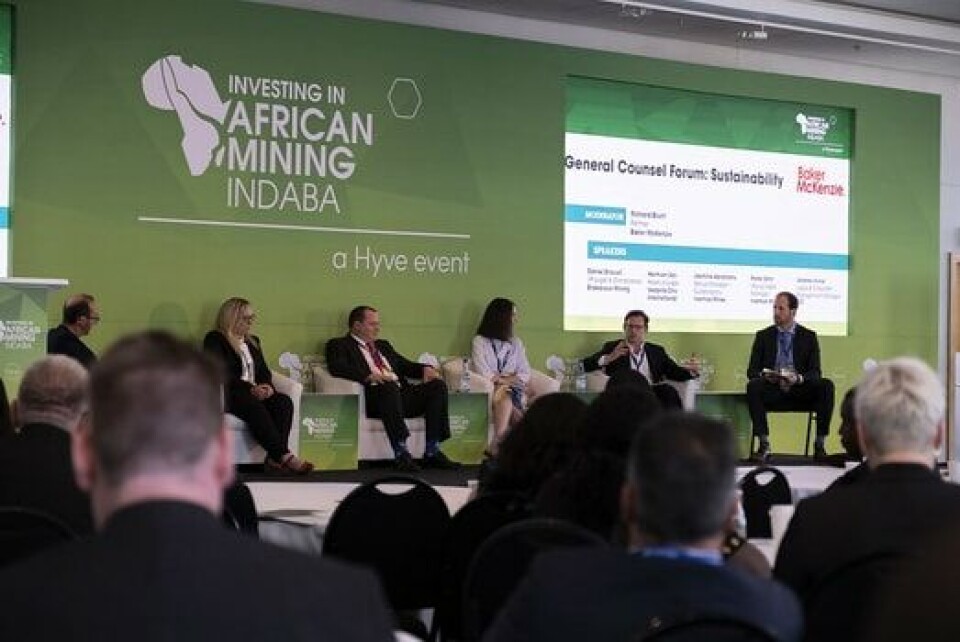Copyright : Re-publication of this article is authorised only in the following circumstances; the writer and Africa Legal are both recognised as the author and the website address www.africa-legal.com and original article link are back linked. Re-publication without both must be preauthorised by contacting editor@africa-legal.com
Taking the High Ground

General counsels have a growing role to play in Environmental and Social Governance in the mining sector. The issue was debated at the recent GC Forum held at the African Mining Indaba in Cape Town. Di Caelers was there.
As the ESG investment philosophy gains traction across the world, it’s critical that lawyers in the mining arena are at the coalface of the debate, assisting company heads to seize the opportunities presented by increased pressure for sustainable mining.
Environmental and Social Governance (ESG) was flagged as a fundamental exercise in risk management for mining houses, with calls from across the spectrum for lawyers to play a fundamental role in safeguarding the process.
The topic emerged as a talking point during Africa Legal’s General Counsel Forum in Cape Town, earlier this month. It was one of the closing sessions at the 2020 Investing in African Mining Indaba, the largest mining investment event in Africa.
“The world’s attention is on the mining space, especially in relation to ESG. Environmental, social and governance engagement carries value and there is pressure from investors to perform,” warned Richard Blunt, a partner and head of Baker McKenzie Corporate EMI/Projects team for EMEA, who moderated a panel discussion around sustainability.
In short, environmental, social and governance criteria are increasingly being used by investors to evaluate companies and ensure they are putting their money where their values lie. These criteria can also help investors avoid companies that could present potential risk thanks to their environmental or other policies.
Today, Blunt told the gathering, companies are increasingly expected to have a purpose that is broader than the generation of profit for shareholders. As boards focus on the requirements of their wider stakeholders to shape and crystallize this purpose, ESG factors will be front and centre.
Panellist Daniel Driscoll, Vice-President: Legal and Compliance at Endeavour Mining, said companies with good ESG scores will be at an advantage in attracting and retaining investors.
While many mining companies have long-running community and environmental programmes already in place, what’s changed “is that investors are now asking more questions about them and their impact, and are looking more closely at the governance of the business,” he added.
“People want to know that their money is not being invested in companies that are undermining democracy, exploiting people or damaging the environment,” he said.
Fiona Edmundson, Deputy Head of Legal: South Africa at Anglo American, agreed. She cautioned that host communities are one of the most important stakeholders in mining companies’ operations
“If we do not take the realities, needs and expectations of our host communities into account, we will continue running into problems on the ground. We need to drive the agenda around local content and local procurement to help create sustainable communities beyond the life of the mine, in collaboration with our host communities,” she said, adding that lawyers must be proactive in helping companies manage and improve ESG scoring as ESG becomes more and more important.
Driscoll’s view was that lawyers are indispensable in the task of persuading business “that these things matter”.
“[ESG] is not something that should be done because you have to, but because it’s good for business, and it cannot be a box-ticking exercise either, it must be genuine. Investors are alert to greenwashing,” he said.
Driscoll further cautioned companies against thinking they could get away with taking advantage of developing or under-developed countries.
“There’s an opportunity for mining companies to really demonstrate their positive impact on the socio-economic development of a country. If you help them to get on their feet, with an approach based on genuine partnership, you’ll have a recipe for long-term success,” he said.
Blunt concurred: “Mining is a long term endeavour – generation of trust between participants is absolutely critical.”
To join Africa Legal's mailing list please click here
